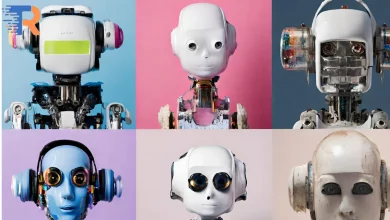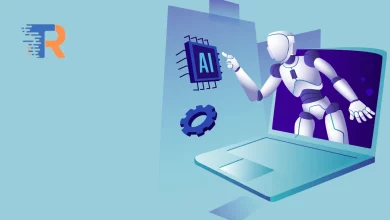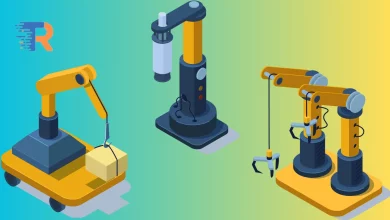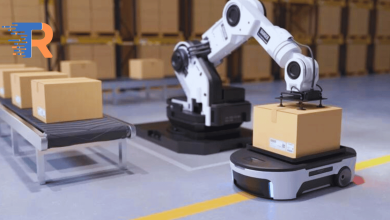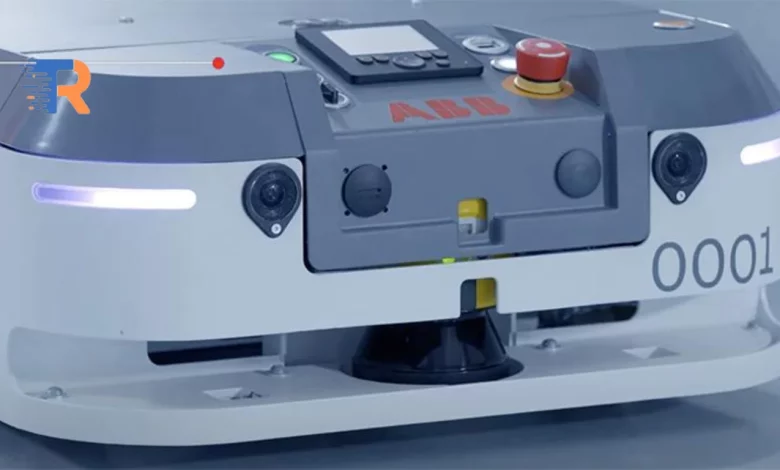
Following a challenging period for providers of autonomous mobile robots (AMRs), Sevensense Acquisition industry leaders are persisting in their consolidation efforts. ABB has recently disclosed its acquisition of Sevensense, a company that integrates artificial intelligence and 3D vision to empower AMRs in distinguishing between fixed and mobile objects within dynamic environments.
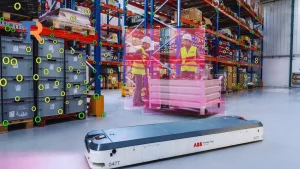
Established as a spin-off from ETH Zurich in 2018, Sevensense’s Visual Simultaneous Localization and Mapping (VSLAM) technology plays a pivotal role in enabling mobile robots to generate maps for fully autonomous operations. This technology significantly reduces commissioning time from weeks to days, enabling AMRs to operate independently in intricate factory and warehouse settings alongside human workers.
Sevensense Acquisition’s VSLAM technology allows a fleet of robots to continually update and share maps, facilitating scalability without disrupting ongoing operations. The company asserts that this approach offers greater flexibility compared to alternative navigation technologies.
Strategic Investment History with Sevensense:
In the essential year of 2021, ABB intentionally invested in Sevensense, overlapping with its notable acquisition of ASTI Mobile Robotics for $190 million. This planned move saw the unified combination of Sevensense Acquisition’s Visual Simultaneous Localization and Mapping (VSLAM) technology into ABB’s Autonomous Mobile Robots (AMRs).
Path of Evolution from Collaboration:
Over five decades, ABB has charted a trajectory of innovation, forging collaborative ties with esteemed institutions like ETH Zurich. A testament to this commitment is the establishment of a dynamic partner ecosystem and startup accelerators, strategically positioning ABB at the forefront of rapidly advancing technologies.
Veiled Financial Details:
ABB maintains a deliberate air of mystery around the financial specifics of the Sevensense acquisition. The exact monetary investment made for this strategic move remains securely undisclosed, adding an intriguing layer to this forward-looking collaboration.
Strategic Rationale Behind the Investment:
ABB’s investment in Sevensense Acquisition is intricately woven into its overarching strategy, where the spotlight is on transformative AI solutions. The emphasis is on technologies capable of catalyzing industry revolutions, with logistics and manufacturing taking center stage.
Read More: AI will transform industry in 2024
Evolution from Partnership to Ownership Narrative:
The decision to acquire Sevensense marks a transformative shift from a mere partnership to complete ownership. ABB Robotics’ investment strategy, focusing on groundbreaking AI solutions with transformative potential, especially in logistics and manufacturing, underpins this strategic move. Ownership empowers ABB to seamlessly embed Sevensense Acquisition’s cutting-edge navigation technology into its AMR portfolio, opening avenues for exploring new markets and collaborative opportunities.
ABB Anticipates a flow in Demand for Mobile Robots.
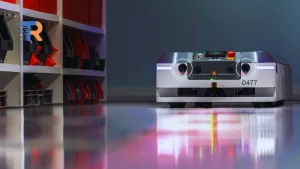
The backdrop of labor shortages emerges as a significant driver for the escalating demand for flexible automation. Sami Atiya, President of ABB Robotics and Discrete Automation, elucidated, “This marks a significant step towards our vision of a workplace where AI-enabled robots assist people, addressing our customers’ needs for greater flexibility and intelligence amidst critical skilled-labor shortages.”
- ABB foresees a rising demand for mobile robots, spurred not just by technological progress but also by customer preferences. Marc Segura, spokesperson for ABB, emphasized, “There is also an increasing demand for this technology from our customers.” ABB’s analysis predicts a robust growth path, estimating a 20% Compound Annual Growth Rate (CAGR) for the mobile robot market through 2026, surging from $5.5 billion to $9.5 billion.
- The recent strategic acquisition further cements ABB’s global leadership in next-generation, AI-enabled mobile robotics. Segura highlighted, “This acquisition fortifies our position as a global leader in next-generation, AI-enabled mobile robotics and allows us to address our customers’ needs for greater flexibility and intelligence.”
At the heart of ABB’s strategy lies the integration of vision and AI capabilities into each mobile robot. This enables them to individually scan distinct sections of an environment. Collaboratively, these robots pool their perspectives to create a comprehensive map, empowering them to operate autonomously in rapidly evolving settings.
ABB regards pilot programs as a pathway to get into various markets.
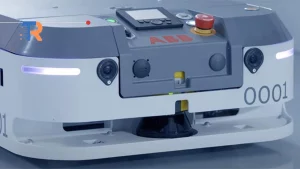
Pilots Paving the Way Across Industries:
- ABB has initiated pilot projects with notable success in the automotive and logistics sectors.
- Ford and Michelin, among others, have reported efficiency gains in U.S. and Spanish production sites through these trials.
- Further expansion is on the horizon, with plans to introduce the technology at automotive sites in Finland, the U.K., and Germany.
Diverse Applications Beyond Automotive:
- ABB is capitalizing on the “unprecedented combination of speed, accuracy, and payload” to explore varied markets.
- In retail and logistics, visual SLAM technology has empowered a major fashion chain to deploy AMRs, streamlining intralogistics processes in complex environments.
- AMRs showcased prowess in delivering supplies upstream, managing finished goods downstream, and navigating busy factories and warehouses with pallets.
Future Horizons: Sevensense Acquisition
- Beyond automotive, ABB envisions expanding this technology into new sectors, including healthcare and life sciences.
- The integration of visual SLAM technology is expected to break down entry barriers for robotics, making automation more accessible.
- Anticipated applications extend beyond current boundaries, signaling a transformative phase for mobile robots and automation across diverse industries.
AI and Data Adding Value, as Highlighted by Segura:
Enhancing Productivity through Robotics and AI Integration:
Segura emphasizes the transformative potential of combining robotics and AI for significant productivity gains. The cooperation enables robots to become more adaptive, freeing human workers to focus on higher-value tasks. While robots outclass in active, monotonous, and repetitive tasks, AI improves their flexibility, allowing them to learn through experience.
Data Acquisition with Sevensense and VSLAM:
The integration of Sevensense and Visual Simultaneous Localization and Mapping (VSLAM) involves collecting a substantial amount of data through 360-degree cameras. AI is utilized to create a map by qualifying features, enabling autonomous and robust navigation that detects and navigates around obstacles smoothly.
Semantic Mapping for Intelligent Decision Making:
Beyond basic navigation, the technology aims to fully semantically map the environment. This advanced mapping facilitates more intelligent and autonomous decision-making processes, elevating the capabilities of mobile robotics.
Gateway to Generative AI and Large Language Models (LLMs):
The mixing of these progressive technologies opens doors to more sophisticated functionalities. Visual SLAM helps as an entry to effect generative AI and Large Language Models (LLMs) in the realm of mobile robotics.
Improving Human-Robot Interaction with AI and LLMs:
AI and LLMs not only facilitate smoother robot movement but also improve responsiveness to users and operators. The evolving landscape enables robots to learn human language, a departure from the traditional approach where humans had to adapt to the language of robots.
Future Vision of AI-Enabled Voice Commands:
Anticipating the future, Segura envisions AI-enabled robots capable of executing tasks through voice commands. This development offers significant advantages, particularly for small and medium-sized companies without dedicated programmers, making automation more accessible.
AI Elevating Robotics to a New Level:
Segura underscores the transformative impact of AI, elevating human-machine interaction (HMI), expanding the skillset of robots, generating insights, and optimizing processes. This shift lowers entry barriers for automation across various industries, making it accessible to a broader audience.
Sevensense, now an integral part of ABB, is set to be a global hub for Visual SLAM AMRs in Zurich,” Segura shared with The Robot Report. Sevensense will maintain its regular business operations, selling its technology under the product name ‘Sevensense’ across diverse sectors. Gregory Hitz, CEO of Sevensense, sees this as a significant moment to introduce their technology to new markets, expressing confidence that ABB is the ideal partner to redefine the boundaries of AI-enabled robotics.

